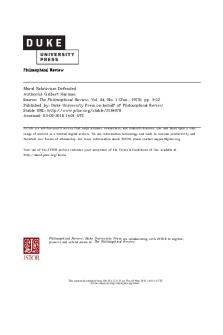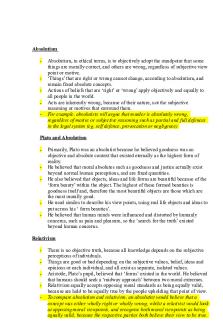Moral relativism and situation ethics PDF

| Title | Moral relativism and situation ethics |
|---|---|
| Course | Religious studies |
| Institution | University of Salford |
| Pages | 7 |
| File Size | 226.2 KB |
| File Type | |
| Total Downloads | 80 |
| Total Views | 129 |
Summary
n/a...
Description
Moral relativism
Consequentialism / Teleology
Actions are right or wrong according to their consequences. → Actions are instrumentally right or wrong (they lead to something good or bad). e.g. testing drugs on animals. May be considered intrinsically bad, but the consequences (human health and safety) are good, therefore it could be considered to be instrumentally good. No action is always right or wrong (right and wrong are not absolute) – it depends upon the outcome.
Advantages
Flexible. Overcomes the inflexibility of absolutism / deontology.(‘baby Hitler) dilemmas. The consequences are taken into consideration; therefore the outcome is likely to be good. The individual has to make a moral decision; therefore actions are more ‘genuinely’ moral.
Problems and questions
How do you know what the consequences will be? Impossible to be certain. E.g. speeding to get someone to hospital. Complicated by the ‘ripple effect’ – consequences may be numerous & farreaching. What consequences should we be aiming for? E.g. Egoism / hedonism – happiness of the individual Utilitarianism – happiness of the majority Surely certain actions are always wrong – e.g. killing humans Cultural relativism NO absolute right or wrong NO rules that apply always to everyone (unlike universalism) J. L. Mackie: “There are no objective values.” (subjective = something based upon opinion. objective = a fact that is not dependent upon belief or opinion.) - The existence of cultural moral differences is proof that there is no such thing as absolute right & wrong → Cultural Relativism For ethical relativists, morality is SUBJECTIVE (dependent upon the opinions / values of the individual or society – not absolute) so we should not criticise or try to influence others. For absolutists / universalists, morality is OBJECTIVE (fact; absolute; real; not dependent upon opinions) so we should criticise & pressurise other societies if we disagree with their standards of morality. Advantages of cultural relativism Tolerance of other societies. Discourages individuals / societies from trying to impose their morality upon other cultures. Realistic – all cultures will never have the same moral beliefs and norms. Recognises the fact that different religions & cultures have different beliefs. Problems ‘Flat Earth argument’. Just because society believes something to be right, is it really so? E.g. everyone used to believe the Earth was flat but this didn’t mean they were right – perhaps it is the same with moral beliefs? Inconsistency. If a moral rule is changed because society changes its views, then what was morally wrong becomes morally right. E.g. abortion, euthanasia, capital punishment.
Doesn’t seem to make sense - suggests that morality may be absolute. If cultural relativism is correct, then it’s impossible to criticise or pressurise other cultures, e.g. Nazi Germany – holocaust, experiments on and execution of mentally handicapped. Relativists are not in a position to criticise these things. → Are there limits to tolerance? e.g. China: infanticide due to 1-child policy. e.g. Africa: female circumcision. e.g. Iraq extermination of Kurds – western nations intervened to stop the genocide. BUT, a relativist would say that we only intervened because genocide is contrary to our moral norms. At the UN, other countries have complained about ‘Western Imperialism’ (imposing Western values on other societies.) → However, surely at least some values are absolute?...... Soft universalism Perhaps some moral truths exist in all societies. James Rachels (1941- ). 3 universal values held by all societies: 1) Caring for infants to ensure survival of the group. 2) Lying is wrong. 3) Murder is wrong. e.g. Old Inuit (Eskimo) culture: custom of killing some female babies due to high death rate among male hunters. An excess of females would lead to group starvation due to a lack of male hunters → some babies killed to ensure the survival of the majority (a Utilitarian principle). Rachels: the right action is that which takes into account the interests of those affected by the action (preference Utilitarianism).
PAST PAPAER QUESTIONS June 2006 / May 2002
(a) Explain what is meant by ‘moral relativism’ (b) Assess the strengths and weaknesses of relativist theories of ethics.
SITUATION ETHICS 1 of 10
Strengths 1.
Strengths
- Individual cases are judged on their own merits, irrespective of what has been done in similar situations. - Individuals are not subject to the rules that bind them. Nothing is intrinsically right or wrong, except the principle of love. - Love seeks the well being of others even if the course of action is not one of preference. - It is modelled on the teaching of Jesus, and so it could truly be considered Christian. - 'Dr Fletcher's approach is the only ethic for a man come of age. To resist his approach in the name of religion will not stop it, it will only ensure the form it takes will be anti-Christian'. John A T Robinson
2 of 10
Weaknesses 1.
Weaknesses
- 'It is possible, though not easy, to forgive pro Fletcher for writing his book... It is harder to forgive the SCM press for publishing it' Graham Dunstan. - Despite Fletcher's attempt to be anti-legalistic, the application of one principle only is, in itself, makes it a legalistic approach. To say no rules apply, and yet to also say the only rule is love, offers something of a contradiction. - The cases on which situation ethics is based are exceptional cases, in which general rules do not apply. Most ethical dilemmas offer an obvious course of action without resulting to situationism. - Theory = teleological, dependant on he calculation of consequences, can't be accurate in making such a calculation.
3 of 10
...
- Theory justifies murder, adultery and even genocide in the interests of love. - Fletcher is overly optimistic about the capacity of human beings to make morally correct choices, and not be influenced by personal preferences. Need rules to prevent moral chaos. - William Barclay warns that freedom can become licence, selfishness and cruelty
4 of 10
Christianity and situation ethics... - Traditional Christian thinkers rejected Situation Ethics. - Pope Pius XII called situation ethics 'an individualistic and subjective...in opposition to the natural law or God's revealed will' - The roman catholic church hasn't abandoned St Thomas Aquinas's natural law approach and views situation ethics as a subjective and individualistic moral approach.
5 of 10
... - Views of ethics are based on rule-based systems of thinking - Because they are good for us or they are God's rules to be obeyed - Situational thinking seems along way from traditional Christian ethics - However it is also true that Jesus seemed to be prepared to set aside some rules in some cases, usually because a person mattered more than the rule. - Situation ethics provides an alternative Christian ethic that is consistent with the Gospel representation of Jesus. - Situation ethics is more consistent with the new testament than natural moral law, providing a corrective to that and other legalistic approaches.
6 of 10
Practicality - Situation ethics is subjective, because decisions must be made from within the situation as it's perceived to be. - It is not easy to be certain that ones' perception of the situation is correct. - We don't have an objective view of morality - Could end up justifying unloving actions - Unworkable, cant determine consequences of every action.
7 of 10
... - S.E depends on the assumption that human beings are free to act morally. - 'Nothing we do is truly moral unless we are free to do otherwise' - Fletcher moral responsibility. - Are we not influenced by our upbringing, environment (are we free) - William Barclay asks whether we are influenced by all sorts, and that we need the law to push us in the right direction of what is right.
8 of 10
The limits of love
- S.E seems to be prepared to accept any action at all if it fits the required criteria. - There is a common sense of when things are totally wrong, and can never be accepted. - What is believed to be a loving end could justify actions that many ppl believe are wrong. - Moreover situation ethics is individualistic because humans see things from there own perspective - Danger that ideals of unconditional love may polluted by a selfish human tendancy or human bad habits. - Agape love = fundamental to S.E, but how can we judge when love is unconditional and when it isn't - How can we be sure when actions come from this? Who is to decide whether motive is pure.
9 of 10
The future of situation ethics... - These criticisms show why situation ethics has not been adopted in main stream churches. - Contextual ethics and proportionalism are two directions S.E can follow - Contextual ethics with is Christian community dimension starts to satisfy some concerns of individualism, without loosing the wariness of legalistic ethics - Proportionalism tries to come to a midway position but in this case it is with the more legalistically orientated natural law ethics.
10 of 10
... - However both of these radical developments are to compromise on one aspect of the radical of situationalist thinking - Situationalist thinking does seem to have similarities with some more recent moral thinking that is beyond christian. - Many old morals = over turned, now seem to be living in a much less certain age.
- Zygmunt bauman-critic of legalistic ethics, legalistic cripples our ability to make moral decisions in the moment when we face a moral dilemma on our own - Undermines our autonomy
PAST PAPER PART ‘A’ QUESTIONS Explain, with examples, what is meant by moral relativism. Explain one moral relativist theory...
Similar Free PDFs

Harman Moral Relativism(excerpt)
- 7 Pages

Moral Relativism Essay
- 6 Pages

3 Moral Dillema - ethics
- 14 Pages

Industry and Marketing Situation
- 3 Pages

Handout 2 - Moral and Non moral
- 3 Pages

Rhetorical Situation
- 8 Pages

Pyramid subcontracting and moral
- 23 Pages
Popular Institutions
- Tinajero National High School - Annex
- Politeknik Caltex Riau
- Yokohama City University
- SGT University
- University of Al-Qadisiyah
- Divine Word College of Vigan
- Techniek College Rotterdam
- Universidade de Santiago
- Universiti Teknologi MARA Cawangan Johor Kampus Pasir Gudang
- Poltekkes Kemenkes Yogyakarta
- Baguio City National High School
- Colegio san marcos
- preparatoria uno
- Centro de Bachillerato Tecnológico Industrial y de Servicios No. 107
- Dalian Maritime University
- Quang Trung Secondary School
- Colegio Tecnológico en Informática
- Corporación Regional de Educación Superior
- Grupo CEDVA
- Dar Al Uloom University
- Centro de Estudios Preuniversitarios de la Universidad Nacional de Ingeniería
- 上智大学
- Aakash International School, Nuna Majara
- San Felipe Neri Catholic School
- Kang Chiao International School - New Taipei City
- Misamis Occidental National High School
- Institución Educativa Escuela Normal Juan Ladrilleros
- Kolehiyo ng Pantukan
- Batanes State College
- Instituto Continental
- Sekolah Menengah Kejuruan Kesehatan Kaltara (Tarakan)
- Colegio de La Inmaculada Concepcion - Cebu








